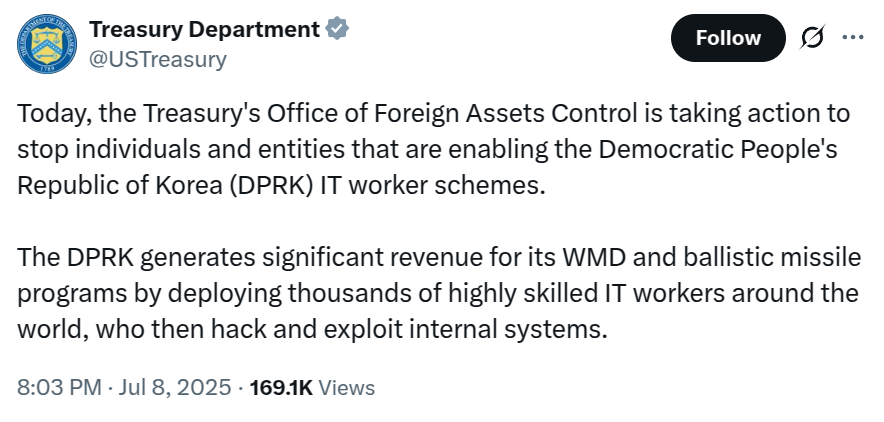
Eight Years for Aiding North Korean Crypto Schemes
Christina Marie Chapman, an Arizona resident, has been sentenced to over eight years in federal prison for her role in facilitating a sophisticated scheme that allowed North Korean operatives to infiltrate US cryptocurrency and tech companies. The announcement, released by the US Attorney’s Office for the District of Columbia, underscores the increasing threat posed by North Korean actors seeking to exploit the digital asset space. Chapman’s conviction involved wire fraud conspiracy, aggravated identity theft, and money laundering conspiracy, painting a grim picture of the lengths to which these actors will go.
A Web of Deception and Financial Gain
The core of Chapman’s operation involved assisting operatives linked to the Democratic People’s Republic of Korea (DPRK) in securing remote IT positions at over 300 US-based firms. These North Korean workers skillfully disguised themselves as US citizens and residents, allowing them to gain access and generate an estimated $17 million in illicit revenue. This complex fraud targeted 68 US individuals whose identities were stolen to facilitate the scheme, which ultimately defrauded 309 US businesses and two international companies. In addition to her lengthy prison sentence, Chapman has been ordered to forfeit over $284,000 in funds tied to the scheme and pay nearly $177,000 in restitution.
The Growing Threat of DPRK Infiltration
This case is not an isolated incident but rather a symptom of a larger trend. Recent reports indicate a surge in North Korean actors attempting to infiltrate various sectors, including crypto startups, using stolen or fabricated identities. Their goal is clear: to generate illicit funds to support North Korea’s weapons programs and evade international sanctions. The US Treasury Department has actively sanctioned individuals and entities involved in these activities, reflecting the gravity of the situation.

Potential Legal Ramifications for US Firms
Companies that unknowingly hired fraudulent workers, like those facilitated by Chapman, could face serious legal consequences. Although some legal experts believe that the likelihood of the US government pursuing companies that were unaware is low, the repercussions could be severe. Depending on the nature of the work, companies that fail to observe reasonable identification verification procedures may find themselves under scrutiny, potentially facing civil penalties, criminal fines, and reputational damage, among other penalties. The situation becomes even more complicated due to the strict liability imposed by US sanctions regimes.
Lessons Learned and Future Outlook
- Heightened vigilance is crucial for all companies, especially those operating in the crypto space.
- Robust verification processes are essential to mitigate the risks associated with fraudulent workers.
- Stay informed about the evolving tactics of North Korean hackers and the latest sanctions guidance.
Chapman’s case is a sobering reminder of the sophisticated threats in the crypto world. As the space matures, so too do the adversaries, making the need for stringent security protocols and unwavering compliance paramount.


